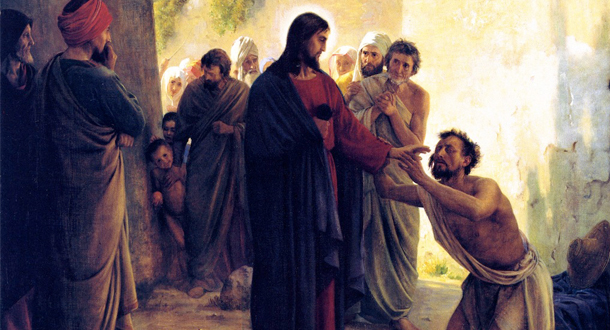 Scripture:
Scripture:
1 Samuel 16:1b, 6-7, 10-13a
Ephesians 5:8-14
John 9:1-41
Reflection:
In our Gospel reading for Sunday (John 9:1-41), we have the encounter between Jesus and the man born blind. The encounter begins when the disciples ask Jesus whose sin was responsible for the man being blind from birth: was it his sin or his parents’? Jesus’ reply is that it was not due to anyone’s sin that the man was blind: “it is so that the works of God made be made visible through him.” In other words, what would be done in this man’s life would be done so that others could see.
Then Jesus gives sight to the man, but it’s difficult for some to see what has happened. Some can’t believe that the same person they knew to be blind can now see. And because Jesus did this on the sabbath, the Pharisees are unable to see God’s hand in what has occurred. But the man himself is able to see what all this means. He not only receives physical sight, but spiritual sight as well. He, at least, can see that Jesus is from God. And when Jesus encounters him after he is thrown out of the synagogue, he believes that Jesus is the Messiah.
At different times in my life, I have been made to see differently. I have had to let go of assumptions about particular people, or groups of people. I have had to let go of certain interpretations of events and what they mean. I have been made to recognize my blindness concerning various things and people. Are there certain aspects of our lives in which we persist in our blindness?
Along with everyone else, I have watched the news about the covid-19 pandemic. And I’ve been wondering whether this crisis has revealed to us anything about our blindness. For me it has revealed that we can no longer be blind to the truth that we are all connected. We can no longer be blind to the truth that we have responsibility for each other. I like what I saw on Facebook the other day that said something to the effect that we engage in social distancing not so much to protect ourselves, but to protect others who may be at risk. And even though social distancing and other restrictions may be necessary, we can see that spiritual and emotional isolation is not the answer.
These kinds of things have been revealed to us before during times of crisis. But it seems that too often, after the crisis has passed, that we are content to retreat into blindness. To keep the sight that we have been given, we need to let the love of Jesus in, and let whatever blindness we have be truly healed.
In our second reading from Ephesians (5:18-24), St. Paul writes: “Live as children of light, for light produces every kind of goodness and righteousness and truth.” Perhaps another way to say this might be: “Let us live as children of sight, so that we can see goodness and righteousness and truth in our neighbor and in the world.”
May God’s love in Jesus Christ heal us of our blindness, and may our restored sight give us what we need to help others to see God’s love.
Fr. Phil Paxton, C.P., is the local superior of the Passionist Community in Birmingham, Alabama.
